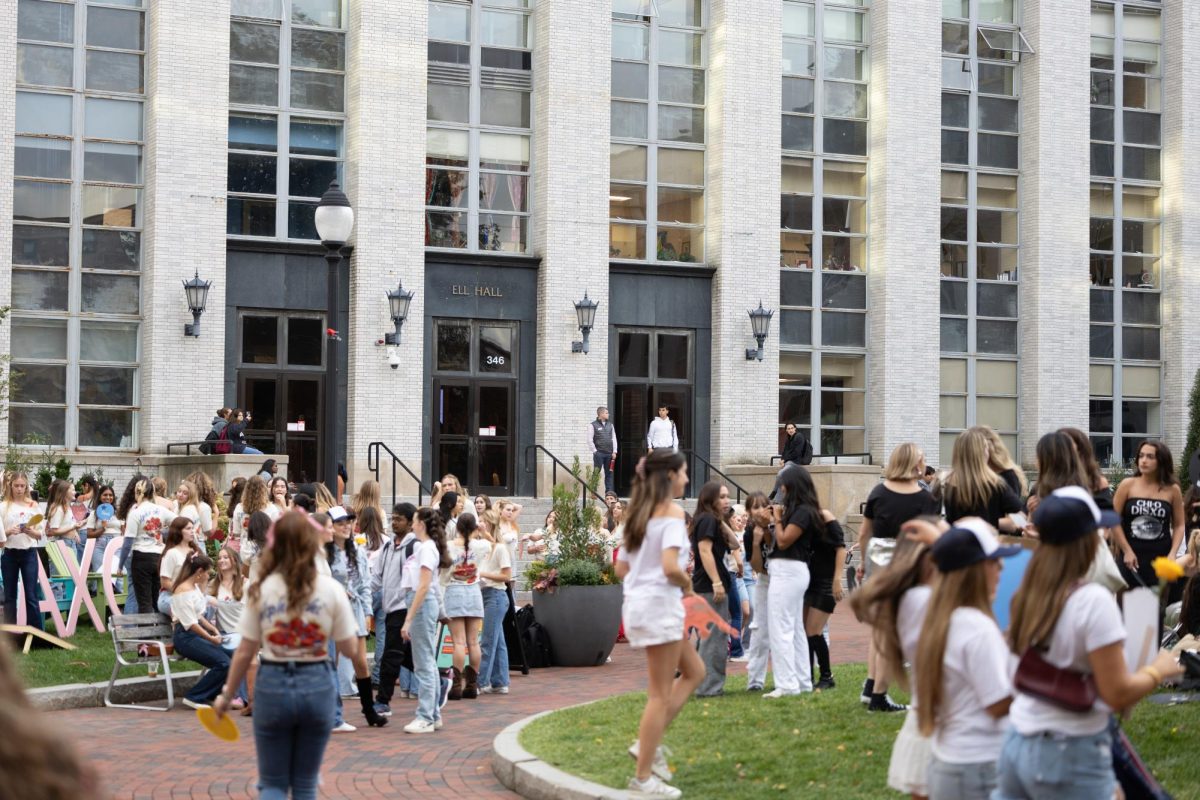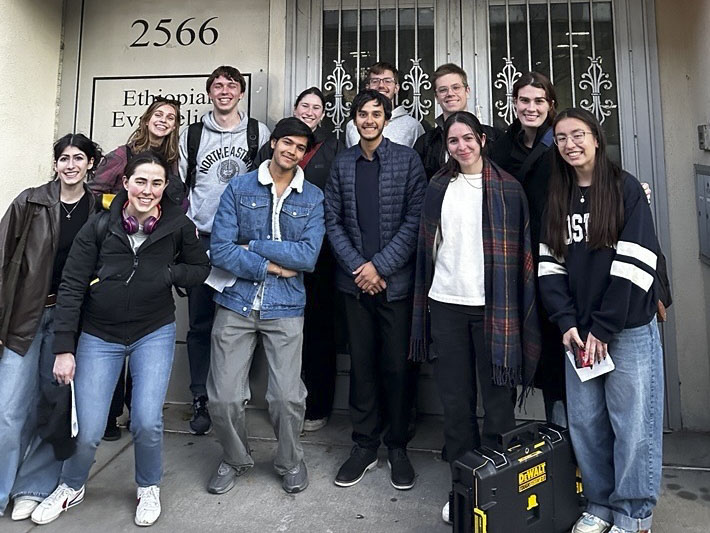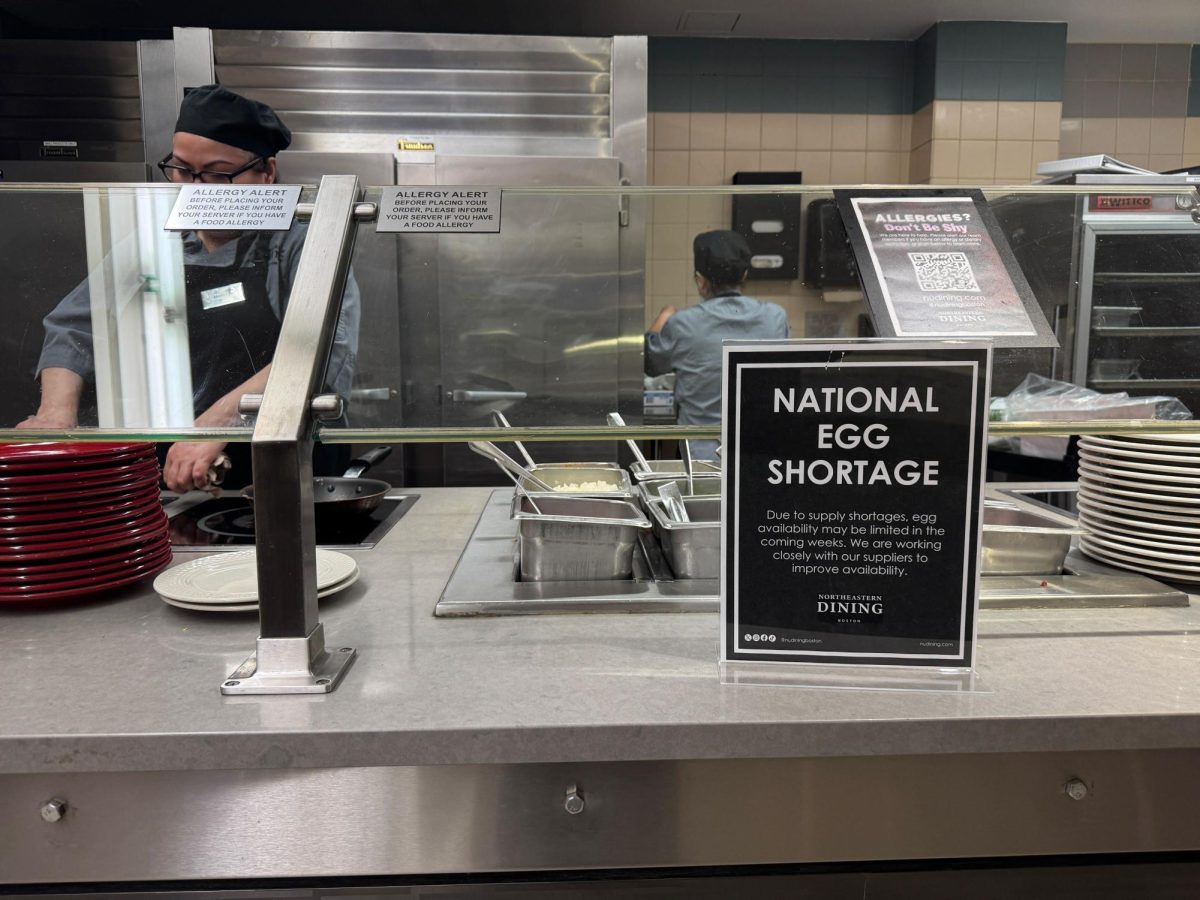The Night Shift
It is midnight. The four floors of the glass and cinder-block building are completely quiet and still. A center of bustling activity during the day, it is now a shadow of its former self, transformed by an eerie silence.
Out of the hush, the Latin beat of drums and wind instruments begins to blare from every corner of the first floor. Two plump middle-aged women with dyed auburn hair and cleaning carts come shuffling out from a side storage area, simultaneously swaying their vacuums and hips to the music.
A dark-haired man with a potbelly and a bin full of trash stands two floors above them, looking over the balcony and smiling at his co-workers. His name is Angelo Villar, and in broken English he talks over the song about his nighttime job cleaning the Curry Student Center (CSC).
“Sometimes I look to join daytime, but they don’t have any. The economy is no good in Massachusetts. The night shift, it’s no good if you like to sleep,” says the 41-year-old Dominican Republic native. His face lights up as he remembers tomorrow is pay day. “The job is just okay, but not too much money.”
In order to make a university run smoothly, many aspects are needed, but the ones most heard about are contained in the front offices. Public relations, financial issues and academic advances of top-notch colleges are daily staples in news publications around the country, especially in college-dominated Boston.
However, Villar is only one of hundreds of employees at Northeastern who perform manual labor through the night — many times unseen and forgotten — to keep the university clean and functioning properly. From plowing crews to maintenance staff, it’s the unheralded tasks every night that keep Northeastern working like a well-oiled machine.
Villar takes a tiny, wrinkled picture of his daughter, Elisabeth, out of his wallet and smirks at how big she has gotten. He sleeps while she attends middle school during the day. He doesn’t see his late-night job as grunt work, but rather as his American dream. He saunters off to continue his shift, picking up trash on the floor on the way with his cart. He will leave just as sunlight starts to stream through the windows of the building, just as another day of classes and meetings begins to take shape. It is through all hours of the night that countless people labor, unnoticed so the students of Northeastern University can have clean buildings to wake up to. And these are a few of their stories.
From Dust to Dawn
The roar of a vacuum cleaner and the jabber of a Spanish-speaking radio disc jockey are the only sounds on the first floor of the CSC. Dora Figueroa is a short woman with a gap-toothed smile.
Figueroa is responsible for vacuuming and dusting the first two floors of the CSC, moving all the furniture and tables and picking up the numerous items of trash left by students grabbing a quick meal at Wendy’s or whose stray notebook papers scatter the floor. She takes the bus from Dorchester every night to get to work, and sleeps from 8 a.m. to 5 p.m. to make up for what she loses while cleaning at night.
Figueroa is one of the 22 million Americans who currently work the night shift, according to the National Sleep Foundation, and the number is growing by 3 percent each year. She works from 10 p.m. to 6 a.m. Monday through Friday for around $7 an hour.
The CSC crew gives the much-used building a thorough cleaning — everything from mopping the floors to filling the paper towel dispensers in the bathrooms to picking up trash left behind by the day’s patrons. They all listen to music or chat with each other while working through the night and into the morning hours.
She brings Villar over to help her translate, as she is from Guatemala and her first language is Spanish. She and her husband moved here in the late ’90s.
“The lady, she come here for jobs and money,” Villar says, referring to her as “lady” as he rubs his two fingers together to represent money. “Not too many jobs in Guatemala.”
Figueroa’s three children are still in Guatemala with relatives, all attending school. Every month, she sends the majority of her paycheck to them to provide for college, clothes, shoes and food.
Villar laughs at one of her quietly-spoken sentences. “Her children super smart, she says.”
They chat for a minute in Spanish about the money the job provides.
“The lady here for same reason as me, no money or jobs during daytime,” Villar says. Both their eyes shift as a ding signals the elevator door opening behind them. A group of five girls, all with clicking heels and silver bracelets, come strolling out, holding shiny gift bags with colorful tissue paper stuffed inside. They split to walk around the two custodians. A minute later, another group of girls, who look the same as the first, come out of the elevator and quickly sidestep Villar and Figueroa, who are now talking among themselves.
A third group, a fourth and a fifth later, all the same, and yet, no smiles or eyes have met those of the janitors. It’s as if they have vanished; as if they never existed at all. Figueroa and Villar don’t seem to be rattled, though, and continue talking as if never interrupted.
“She says maybe later children apply for green card and come to U.S.,” Villar translates. “This makes lady very happy.”
Eventually the two return to their night time duties, wishing each other a “Feliz Navidad” before going their seperate ways. Figueroa hums to herself as she pushes chairs out of the way and Villar empties trash cans lining the third floor, both of them knowing their shifts are far from over.
Salt, sand and sleepless nights
A Doppler Radar flashes on the computer screen behind a desk full of children’s school pictures and Red Sox paraphenalia. A bright blue cluster stands out against a screen full of green, and moves slighty as the picture refreshes itself every 30 seconds or so. Mark Boutler’s wedding ring shines in the artificial light of his office as he points to the image.
“See that blue? That’s snow,” he says. “It consumes my life for four months out of the year.”
Boulter is the director of Building Services in the Facilities Department at Northeastern, which is in charge of snow removal during the long New England winters. However, Boulter, unlike many supervisors in offices of different occupations around the country, is on the front lines with his crew when Old Man Winter strikes, and is often the first one to start plowing and the last to leave. He is quick to sing the praises of his crew, who he refers to as an “extended family.”
“They all have families, yet NU is still a priority to them. When the call to duty comes, they’re here. I couldn’t be more proud of the team that works with me to get the job done,” Boulter says.
He leans back in his chair and tells stories about different snowstorms that demonstrate his crew’s faithfulness to the job.
“Last December, when there was the first huge snowstorm, we came in from midnight on Friday until 3:30 a.m. on Monday. It’s a lot of handwork and it’s very labor-intensive. But they’re very dedicated.”
Boulter, a Northeastern graduate heading into his 21st year of employment at his alma matter, watches his radar every day, and when a snowstorm is predicted to hit, he makes plans to call in his crew at least an hour before the first snowflake is supposed to fall, citing safety concerns about his employees on the road in bad weather. The team is made up mostly of members of the Northeastern Facilities Department, and Boulton boasts half the crew are volunteers, including 27 part-time student volunteers, many of them football players.
Snowstorms don’t always hit at convenient times or dates, and Boulter says almost all the employees have families, and many times single parents must make arrangements for children to be watched or cancel plans with relatives to go out for a storm.
“There’s dads who aren’t there for a lot of holidays and birthday parties. There’s a lot of personal sacrifice,” he says.
He looks at a picture of his sandy-haired son while remembering a very white Christmas a few years back.
“We came in at 10 or 12 in the morning and worked right through the night and into the next morning,” he says with a smile. “It wasn’t a very pleasant phone call I had to make to everyone, but snow comes whatever the day is.”
Boulter jumps at every opportunity to talk about his staff, and the way his face glows makes the close relationships and bonds between them apparent, despite the nature of their job.
“It’s really the people that make the job, the comraderie and sincereness everyone has with each other, there’s a family atmosphere, and we try to stay close,” he says. “It’s a thankless job too … we don’t really hear the good news, only the complaints.”
Boulter continually checks his radar. If it does snow, he will assuredly be up for at least another eight hours, but his eyes show no sign of weariness.
“I enjoy it, I really do.”
A watchful eye
On the lower level of the footbridge leading from campus to the Columbus Parking Garage, John David can be heard quietly humming to himself.
As a security guard working the night shift two to three times a week, he sits in his secluded booth from 11 p.m. to 6 a.m., taking occasional breaks. He is nonchalant about his work, and describes how every night has a little variety.
“Every night is different depending on which side you’re on or which post you’re at,” the 44-year-old says. “Sometimes you do patrols, sometimes you have to check up on stuff and sometimes you just sit there, hanging around on the bridge.”
A native of Somalia, David has lived in America for almost 20 years and only a trace of his accent can be heard when he rolls his R’s. Now divorced, he has one son and doesn’t find that his job interferes with his life as a parent.
“It’s just you adjust to it, you do what you have to do, you work around it,” the Brookline resident says with a shrug of his shoulders.
The human body follows a natural 24-hour period of wakefulness and sleepiness that is regulated by an internal circadian clock, which is linked to nature’s cycle of light and darkness, according to the National Sleep Foundation. When the sun rises, our internal clocks wake up with it, even if we haven’t slept the night before, causing many night-shift workers to have trouble falling asleep and staying asleep during the daytime.
David admits he does sometimes have trouble catching up on missed sleep during the daytime, but looks at it as just another thing he has to do — just another part of the job.
“Sometimes during the day or evening, I’ll try to sleep, but it’s almost like I’m so tired I’m awake,” he says with a smile. “But you sleep when you have to sleep I guess.”
Just like many of his colleagues, David took the job for the money, and because he was available to work at night. However, he does not plan to work through the wee hours of the morning for an extended period of time.
“For now, it suits me. But I would rather work during the day, and I keep looking into that.”
A white Northeastern security van pulls up to take him for a quick break and caffeine fix in the form of black coffee. He takes his time walking down the stairs with his hands in his pockets, but removes them to shake the hand of his waiting driver. As the van rumbles off, the few stars able to be seen despite the city lights are slowly beginning to disappear into the night sky, and the slightest trace of pink can be detected on the horizon.
In his Dorchester apartment, Angelo Villar is sleeping until his daughter returns from school.
Dora Figueroa puts a check in the mail for her college-bound children and drifts off, not to awaken until shortly before another night of work begins.
Mark Boulter, armed with snowplow and shovel, will be putting the final touches on an icy sidewalk outside a West Village apartment building next time it snows.
And John David watches students pass by on their way to early morning classes, studying and chatting as they cross the footbridge.
And with that, another day – and night – begins.









